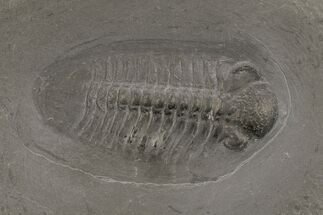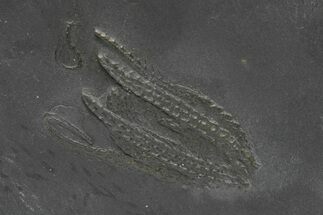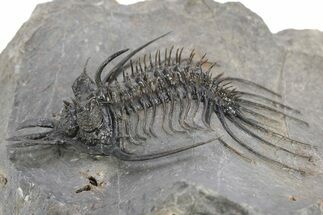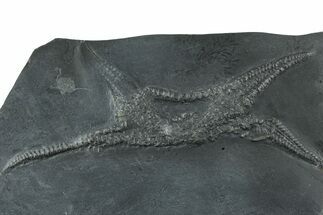This Specimen has been sold.
4.4" Pyritized Trilobite (Chotecops) Fossil - Bundenbach, Germany
This is a 4.4" long, pyritized trilobite (Chotecops ferdinandi) from the Hunsrück Slate of Germany.
It comes with an acrylic display stand.
It comes with an acrylic display stand.
Most of the Bundenbach quarries have been closed for some time, so a very limited amount of material is coming to market from this area.
The lower Devonian (lower Emsian) slates from Bundenback have been quarried for roofing material for centuries. Quarrying continued until the 1960s, when the competition from cheaper synthetic or imported slate resulted in production decline. The last pit closed in 2000. Mining of Hunsrück slate was important for the discovery of Paleozoic fossils. Although not rare, fossils can only be found through extensive mining and time-consuming preparation: fossils are hard to see lying under the surface of dark slate. But in 1970, Wilhelm Stürmer, a chemical physicist and radiologist, developed a new method to examine the Hunsrück slate fossils using medium energy X-rays.
The Bundenbach “Hunsruck Slate" is famous for yielding one of the most important assemblages of Paleozoic fossils, representing 260 animal species including mollusks, echinoderms and arthropods, of which the phacopid trilobite Chotecops is certainly the most abundant.
The lower Devonian (lower Emsian) slates from Bundenback have been quarried for roofing material for centuries. Quarrying continued until the 1960s, when the competition from cheaper synthetic or imported slate resulted in production decline. The last pit closed in 2000. Mining of Hunsrück slate was important for the discovery of Paleozoic fossils. Although not rare, fossils can only be found through extensive mining and time-consuming preparation: fossils are hard to see lying under the surface of dark slate. But in 1970, Wilhelm Stürmer, a chemical physicist and radiologist, developed a new method to examine the Hunsrück slate fossils using medium energy X-rays.
The Bundenbach “Hunsruck Slate" is famous for yielding one of the most important assemblages of Paleozoic fossils, representing 260 animal species including mollusks, echinoderms and arthropods, of which the phacopid trilobite Chotecops is certainly the most abundant.
SPECIES
Chotecops ferdinandi
LOCATION
Bundenbach, Germany
FORMATION
Hunsrück Slate
SIZE
4.4" long, 9 x 7.3" slate
CATEGORY
ITEM
#209926
We guarantee the authenticity of all of our specimens.
 Reviews
Reviews











